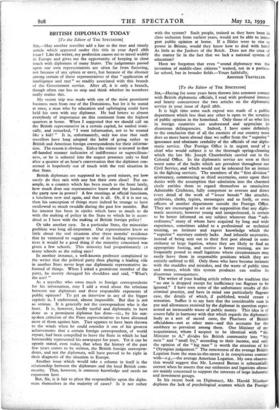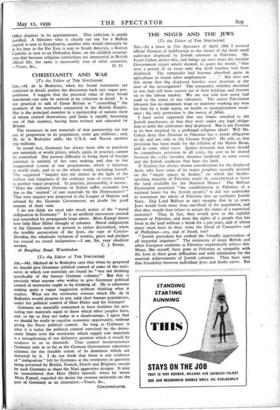[To the Editor of THE SPECTATOR]
Sta,—Having for some years been thrown into constant contact with British diplomatic officials, I read with profound interest and hearty concurrence the two articles on the .diplomatic service in your issue of April 28th.
It is high time some such exposé was made of a public department which less than any other is open to the scrutiny of public opinion in the homeland. Only those of us who live in foreign countries can understand and appreciate its disastrous delinquencies. Indeed, I have come definitely to the conclusion that of all the enemies of our country 'none does us more harm abroad than we suffer from the " superior " ignorance and obstinate credulity of the officials of our diplo- matic service. Our Foreign Office is in urgent need of a chief who would subject it to the thorough spring-cleaning which the late Mr. Joseph Chamberlain carried out in the Colonial Office. In the diplomatic service are seen at their worst some of the faults which are prevalent throughout our Civil Service, and which would not be tolerated for an instant in the fighting services. The members of the " first division " aristocracy, commencing as third secretaries, enter upon their duties with the assumption that -admission into the charmed circle entitles them to regard themselves as omniscient Admirable Crichtons, fully competent to oversee and direct every detail of the work of " lesser breeds " like attaches, archivists, clerks, typists, messengers and so forth, or even officers of another department outside the Foreign Office. They are encouraged to act on the supposition that any diplo- matic secretary, however young and inexperienced, is certain to be better informed on any subject whatever than " sub- ordinates," many of whom have acquired by long and wide experience, sometimes added to a professional or technical training, an intimate and expert knowledge which the " superior " secretary entirely lacks. And infantile secretaries, instead of being sent out to their first post abroad in some embassy or large legation, where they are likely to find an appropriate footing, and receive a better training, are too frequently posted to small legations where circumstances may easily leave them in responsible positions which they are entirely unfitted to fill. Only those who have become intimate with the muddles and mistakes, and the waste of public time and money, which this system produces can realise its disastrous consequences.
The writer of your leading article refers to the tradition that " no one is dropped except for inefficiency too flagrant to be ignored." I have seen some of the unfortunate results of this criminal practice, and have in mind one particularly flagrant case, the details of which, if published, would create a sensation. Suffice it to say here that the considerable sum in pay and allowances received by the diplomat in question repre- sented an inexcusable waste of public money. This idea is of course fully in harmony with that which regards the diplomatic body as a sort of sacred caste, the Pharisees of British officialdom—not as other men—and this accounts for the snobbery so prevalent among them. One Minister of my acquaintance, whom I suspect to be identical with " the Minister to A," divides his British community into " big men " and " small fry," according to their income, and only the opinion of the " big man " is worth the attention of his " Olympian judgement." The remoteness of the average British Legation from the man-in-the-street is in conspicuous contrast with—e.g.,—the average American Legation. My own observa- tion would suggest that Mr. Leonard Barnes is substantially correct when he asserts that our embassies and legations abroad are mainly concerned to support the interests of large industrial and investment groups.
In his recent book on Diplomacy, Mr. Harold Nicolson deplores the lack of psychological acumen which the Foreign Office displays in its appointments. This criticism is amply justified. A Minister who is clearly cut out for a Balkan capital is sent to Scandinavia, another who would obviously be at his best in the Far East is sent to South America, a Roman Catholic is sent to an Orthodox State, on the childish assump- tion that because religious convictions are immaterial in British official life, the same is necessarily true of other countries.



















































 Previous page
Previous page